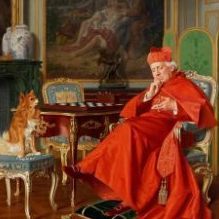-
Posts
156 -
Joined
-
Last visited
Reputation
1087 Godly
About Iudaes
- Birthday December 3
Contact Methods
-
Minecraft Username
XVIGoldIVX
Profile Information
-
Gender
Male
-
Location
'Murica
-
Interests
Writing
Character Profile
-
Character Name
James Francis
-
Character Race
Human - Heartlander
Recent Profile Visitors
7816 profile views
-
Form of Enumeration Full name: Fr. Ernst Summers’ old: Ninety and seven summers. Clerical role: Priest, Friar of Wigbrecht Diocese of Service: N/A Minister of Ordination: Gawain Cardinal Providentia Racial identification: [!] “Human, child of Horen” had been filled out on all admission forms [!] Sex: Male [Username: ] XVIGoldIVX [Discord: ] Gold#4757
-
Everyone knows the god in Canonism is a sky whale
-

Canonist Sites Around Almaris, 1st Edition, circa 1861
Iudaes replied to Burnsider's topic in The Church of the Canon
- 1 reply
-
6
-
ADDRESSED TO THE PRELATE OF THE CLERGY, TO THE MOTHER CHURCH, AND TO ALL GOD’s FAITHFUL. WHERE ART THOU LORD? THE THESIS OF AN ACOLYTE FOR HIS EMINENCE’s REVIEW ☩ In every age and every era has and will the Lord exist, for He is the sole persisting force who is beyond time, One who has lived and shall always live, and by whom eternal life will be granted unto men, for His eternity is the only eternity (Virtue 7:5). It is through Him that our souls are nourished and through His own existence that we may live ourselves, for it is by Him that the world was created and through His ever eternal mercy that we are raised in goodness, not abandoned to languish. With that said, the joys of which we enjoy day in and day out assuredly owe their existence solely to Him. The fact is, all is of Him and thereby, all is proof of Him. Yet, since the days when men strayed from God, the faithful have known the whispers that God does not exist or that God does not care. They claim that surely a good God cannot exist when evil persists in that which He created. That surely as men die and suffer, or as murderers and adulterers alike commit their crimes, the Lord is certainly uncaring, for what benevolent force could ignore the ills of this world. We, the faithful, know full well that these beliefs are false. However, this does not dismiss these persistent whispers, many of which certainly come from the mouths of nonbelievers or heretics, but others simply from those stricken by tragedies, like the loss of family, or a natural disaster, or war. These whispers cannot be ignored and must be addressed. Firstly, the question of the existence of God. While for many, the existence of the world and of us ourselves is enough proof, for certainly, where did we come from if not from God, many others believe the silence of God still reigns supreme, alike to the days after Exalted Owyn’s death (Gospel 5:28), and they, like the many who strayed from the path during these times (Gospel 5:30), accept this perceived silence as proof that God does not exist. As all other answers, the answer for this can be found in Scripture. The ills of these men and women are simply due to the fact that they know nothing of how God communicates. Scribed by Exalted Godfrey in the Scroll of Gospel, God communicates this, “In every era the Lord provides signs of His watchfulness: the miracles of holy men, as He provided to Owyn in the greatest city of Edel.” (Gospel 5:27). Perhaps the best proof of God lies in the communion of Saints, who, during their lives, and posthumously as well, perform miracles. An uneducated mind may see this as the work of a mage, however, the intercession of the Saints comes not from any skill they themselves possess or possessed, but purely from the Lord. Still, many might say that obscure miracles, like those of ages past, such as that of Saint Tylos, or those performed by Saint Lucien, are merely fables or purely coincidence. While they should be admonished for their lack of faith, more current and verified miracles can nevertheless be provided. Ones most recent and witnessed by thousands are the actions of Saint James II, a Pontiff whose deeds are from which the Basilica in Providentia, the Argentate Star, receives its namesake. To speak specifically, High Pontiff Saint James II, by the accounts of many witnesses, was present at the battlefield in Arcas at which the final stand against the Inferi took place. Upon petitioning the Archangel Michael, he and a host of Aenguls descended from the Skies to battle alongside the descendant’s forces. While this is attributed to the intercession of Archaengul Michael rather than High Pontiff Saint James II himself, it is nevertheless an action of God, and what many believe to be certain proof of his existence. Too, the Scrolls themselves are proof of God, which, while perhaps bearing lesser weight to the nonbeliever, are nevertheless the most strong evidence to any Canonist. Besides our beliefs that Scripture is absolute truth, of which contains certain proof that the Lord exists, if one wishes to view the Scrolls from a historical perspective, two among them were written by a pair of the Holy Orenian Empire’s greatest, and most well known Emperors, and the details in the Scroll of Gospel for instance, as written by Exalted Godfrey, are accepted as historical accounts among many experts, and have even been told to be verified by the longest lived members of our societies who were present at these times. Some can say that Exalted Godfrey was lying, however, with other evidence provided, that claim can mostly be disregarded, or at the very least, easily debated. Too, some may say that the Prophets and Emperors Godfrey and Sigismund were simply delusional. Besides this being quite the offensive and heretical claim, if they were delusional, you must too question the competence of the respective rules, of which are some of the longest and most acclaimed. Lastly, the issue of prayer. Many say that God does not answer and that God is silent because of the very fact that He fails to descend from the Seventh Sky and speak directly into their ears. This claim is preposterous and simply a failing of the individuals to recognize, as most Canonists can, the voice of God. Such an argument could even be compared to written letters, for most do not question that a letter from a ‘Goddard’ is a letter from ‘Goddard’, simply because he failed to hand deliver it to them. Certainly a stretch but just as preposterous, at least to Canonists, as that worry would be to all. The matter of fact is that God does speak, though simply not as we do. God acts through those miracles told of prior, or through the blessings that he bestows directly, or through signs which He provides to His faithful. Many have even felt his very presence after prayer as a miraculous statement from God that He is there. Too, many of those who claim that God does not answer may simply be praying for the wrong thing. Tales have been told of married men who beseech God earnestly for the certain attention of a woman not their wife, and who are then flabbergasted when they are ignored. You must simply “listen”, for God does answer. Secondly, the question of the goodness of God. We Canonists know that God is Good. It is a fact drilled into us from our youth to the very day we die, not only during the liturgy or the reading of Scripture, but too, in the joys and blessings He provides us day in and day out. It is a truth we know, just as the fact that the sky is blue or that the grass is green. However, the accounts of men who are stricken by tragedy cannot be ignored. As said prior, there are men who are murdered, wives who are betrayed, and poverty which relegates millions to languish. There is much suffering in this world, and many souls who accept that, foolishly, though at many times, understandably, as proof, not that God does not exist, but that He is not good or does not act. Yet, GOD is GOOD. First, the matter of sin. As said prior, much of the suffering which afflicts our world and those who reside upon it is not due to natural disasters and over all, what has been dubbed “acts of God”, but due to many men and women who share it with them. The men who are murdered are killed by murderous men. The wives who are betrayed are betrayed by adulterous husbands. The poverty of many is caused by the greed of others. These men, these wives, these beggars, and many others are left to ask, how could God allow such a thing? Why does God not intervene? Why has God forsaken me so? He has not forsaken you. The answer to this lies in free will. We must ask ourselves firstly, would we like choice over no choice? Would we like to have agency over our actions, or would we like God to control us like marionettes? Many of you would likely pick the former to that question. The fact is that we do have free will and the majority enjoy that (besides for some possible, unaccounted for minority). However, with that naturally comes a choice, which is the choice between good and evil, and those various decisions therein. God has blessed us with free will, however some choose to misuse that which He has bestowed unto us. It is not like we have been left with no instruction though, for through His Prophets, God communicated the four Scrolls, which set out the rules of the faith, and too, provide lessons and accounts that exemplify the state of virtuousness for all. We simply need to use the blessings of which we have been given right, with the guidance of God to help us. Thereby, murder and adultery and poverty and all the tragedies which occur are ills of men and not of God. Second, the matter of those aforementioned acts of God. This is a more complicated question and one that has a more frustrating answer then the last. God does things for many reasons, and we cannot assume to know them, for we do not know them at all. He places many trials before us, and certainly, the storms that cause irreparable harm, the men taken not by men but by God, and all other such things are not of men themselves. Therefore, why does God allow this? We do not know. However, we do know undoubtedly that He is Good. Again, a most frustrating resolution alone, but even here, it is not without evidence. We know assuredly that God is not silent and, indeed, He does act. In fact, much of the good that happens can be attributed to Him directly. For instance, men who were blinded had their sight return through the intercession of the Saints. The healing of injured men, of which many a time are seemingly doomed for death, can be attributed to God. Even the relief of death after debilitating illness can be a good of God, for all the virtuous are promised the Skies upon their deaths. In fact, those Skies are a miracle themselves, for certainly do we stumble, and yet God is eternally forgiving, and despite our sins, if rightly absolved of course, we too can achieve eternal life. Thereby, even the deaths caused by storms and other such things, or even those of murder or of war, have their resolution, for we all who are virtuous await eternal life in the heavens. All this, however, does not discount the suffering of millions. It is true that God exists and that God is Good, but it is also true that the ills of this world are innumerable and they all affect the men and women, even the virtuous, who reside here. Nevertheless, we cannot be disheartened for we must know that God is always here and God’s benevolence relieves the suffering of all. This can be difficult, though, as in many other things, we must merely look to the example of the Saints, of the Blessed, and of the Venerable, many of whom experienced hardship countless times throughout their lives, yet all of whom deserve to be known as Saints. All of them knew that God is there and God is Good, for how could they have persisted in their faith, even when the challenges of the world were so overbearing? They believed wholly in God, and understood that, whether in life or in death, He would act to heal their scars and make them whole again. You must merely have the same faith. I must merely have the same faith. As the Saints did, we must all believe in those two truths, and each and every answer will be known. Faithful Always, Faustus
- 1 reply
-
10
-
r
-
Best Prelate this Pontiff could have ever had. Always enjoyed roleplaying with you dude and was glad to help wherever I could during your Pontificate. All the best, bro.
-
OF THE HIGH PONTIFF EVERARDUS SEXTUS WRITTEN ON HIS BEHALF BY FR. ERNST, IN RESPONSE TO THE PROVOST’S TRACT VI. Salutations, Beloved Brothers. Certainly has the matter of tradition been a central tenet of the Church and Her mission since those days of yore when Her first shepherds, the Saints Evaristus and Clement, were ordained by Exalted Owyn, for it was the Scrolls, the absolute Truth of God, which were the basis of their duty, “He entrusted to them the Word of GOD, which were the Virtue and the Spirit, and charged them to instruct their brethren in the path of holiness.” (Gospel 5:4). Too have, over these many centuries since Her inception, many traditions inspired by the interpretations of God’s Will been adopted and respected. It is His Word and those dogmas and doctrines derived from said Scripture which make up the spirit of the Mother Church, and such is a spirit that must be preserved, a fact believed wholly by His Holiness and his Curia. It is for this reason that I firstly wish to begin with thanks to you, good Provost, and to all those who have expressed concern post-publishing of the High Pontiff’s most recent Bull. Clearly, it is you faithful who care solely for the health of the Church, of which is paramount in a world where She is so vital to the mission which He hath ordained. Yet, in saying that, I do pray that with clarification, these concerns become nothing but concerns and not a stance challenging the infallible will of His Holiness, of which the fathers of the Tractarian movement, such as Saint Pius of Sutica, recognized. With that said, I shall address your work as decisively and clearly as possible, beginning with your interpretation of the latest Bull. As you did in Tract VI, I shall too quote Section VIII: “We call on all faithful Canonists to answer God’s call, for we are all called to service by the Lord of Lords, the King of Kings. Those who are skilled in fighting may serve God by joining the Supreme Order of the Exalted Owyn, and using their skills to protect Our clergy and Our flock. Those with a gift for speaking and interpreting may join to become a monk or a priest, to shepherd parts of God’s flock. Women too have a calling, either to serve as a deacon and aid priests with services or even perform them when no priest is available, or as a nun to provide charity and compassion to those who have none. All who wish to accept this higher calling are urged to speak to their local clergyman. Let all things be done for the greater glory of God." As you stated, the word “services” in section eight does indeed refer to both mass and the sacraments, but not in any priestly manner. I shall begin with mass, of which you correctly clarify later on; mass and such methods of teaching similar in nature are not strictly of the Priesthood but have been, throughout history, carried out by those not ordained, such as Venerable Julia of Haense (an example you graciously provided), Acolytes, and even His Imperial Majesty, Philip II. It is indeed associated heavily with the ordained and therefore, of course, the sermons and theses of a Priest are preferable. Of course, a mass may become sacramental if celebrating certain sacraments is required to perform it, as in the example of the Judite Rite. I will first reassure your penitent that His Holiness does not believe that a layman may celebrate a sacrament. The closest he may come (and then only when the need is perilous) is to perform an ablution in extremis, which is no more than a ceremony marking the penitent’s solemn desire for the sacrament, and a petition to God that He may grant His Grace in an extraordinary way. This is a provision you mention throughout your Tract. I will quote the Codex of Canon Law: “§4. The validity of an ablution in extremis is never assumed, though it is desired. If a penitent has received ablution in extremis, they are obliged to seek out a cleric and receive a sacramentally valid baptism as soon as possible.” Citing your Tract, good Provost, “Thus, the layman who 'administers' the Sacraments, does not do it as such, but acts as a marker of the desire of the person to receive them which cannot be realized, and this desire gives the graces of the Sacrament without itself being the Sacrament.” Verily, this is true, for it is God who works through all things. While certainly it is the Priests of the Church who are the sufficient means in which God absolves and blesses and teaches, it is in the absence of sufficient means where the power of God is truly demonstrated. Unlike even some of the most skilled of artisans, it is the Lord who can take such an insufficient tool as a man, or a woman, unordained, and still enact His Will. As the Codex states, it is ablution, humbly petitioned through these insufficient means, which can indeed be valid, but should be affirmed by more sufficient means when they are made available to the penitent. This right is provided to each layman and therefore extended to deaconesses as well. It is this right purely too. Can deaconesses act as celebrants in the Sacrament of Matrimony? They cannot. Is a deaconess able to consecrate water? No, she is not. Can a deaconess consecrate a Church? She cannot (though, I cannot even do that). It is ablution in extremis which is the right of the deaconess, nothing more, and His Holiness extends his apologies for any lack of clarity on the matter. Simply put, in an age where our growth has slowed, the Church needs “all hands on deck” so to speak, and in his capacity as Pontiff, His Holiness has welcomed women into the fold in a non-sacramental manner, which, as I said prior, is not a breach of traditional thought but instead a use of law which was codified by St. James II and voted upon by the Church entire. Finally, you, good Provost, address concerns of schism, and here, I do agree with you. You say firmly to your flock, “schism should be as far from our minds as iblees, for iblees is the author of schism,” and in this, I echo you. Any Canonist who strays towards schism over such a matter as deaconesses is admonished to rely more closely upon the pastoral authority of the Church before making his judgements. Petition the Chair of St. Daniel as the good Provost does now; inquire and do not betray, for certainly schism would threaten all the good that the Church has done and will do, for the sake of combatting something which, I cannot stress enough, is not a contravention and does indeed, as per Canon Law, adhere to the traditional values of the Church, those which safeguard the sacramental, but permit the reform of matters of doctrine alike to the deaconess. With that said, His Holiness once more thanks you, Provost, for having authored this Tract which is, in it’s expression of concern for the sake of the Church, an insight into the worries and questions of the lay faithful. It has given the High Pontiff the chance to clarify and for that, he expresses his utmost gratitude. His Holiness prays that with the newfound clarity given to this matter, we may move forward with these reforms with our traditions most certainly intact and our unity strengthened, the Church bolstered by the deacons and deaconesses who have been encouraged to join Her. May God watch over His Church and may He bestow unto you all the blessings you deserve. Peace be upon you. Forever a Brother Among Brothers, Fr. Ernst
- 1 reply
-
8
-

AND THERE IS NO PAIN WITH GOD, BUT WITHOUT HIM
Iudaes replied to LithiumSedai's topic in Order of Saint Nicolas
RESERVED -
As Basil succumbed to death and ascended to peace, passing through those heavenly gates which marked the end of mortal life and the beginning of the eternal, the Cardinal would, at some point, be met by the face of an old friend. Jude II, healed of all mortal wounds and dressed in fine, pure white silks, would take Basil with his hands by each of the Father's arms, speaking unto him with a joyful smile, "Oh, dear Basil--once my subordinate, now my equal in joyous and eternal servitude to the Lord. I welcome you, brother, to true peace, of which, verily, you are deserving." he said in an exuberant tone. "While we may have disagreed at times in life, I recognized you as a man of duty, your toils endless. The construction of the Abbey under my Pontificate remains to be one of your great feats. And even in your aging days, you undertook an even greater project--the repairing of the Basilica at the heart of our Holy See." he nodded. "Certainly, you, in your advocacy for all, are a virtuous man and now sit among the virtuous in these here Skies. Speaking of which, I do believe Father Gawain awaits you. Go, dear friend." With that said and a pat laid upon Basil's shoulder, the Venerable Pontiff left the man of virtue to his eternal rest, where those pains inflicted unto him in life and upon death would all be washed away by the hand of GOD.
-

Encyclical Letter - Deus Absolves Omnes
Iudaes replied to Pureimp10's topic in Ecclesiastical Decrees
Father Ernst looked favorably upon the Encyclical Letter. "His Holiness acts as all of the Church should; with mercy, as God commands. May his forgiveness of the faithful's errors continue to unite Canondom, as he has already worked hard to do." he said, commenting to an Acolyte at his side. After having placed it down, the Pontifical Secretary would traverse the Papal Apartments to try to find Everard IV himself, so as to thank him for his continual efforts for the good of the faithful in mind. -
Father Ernst nods, knowing that in His Holiness Everard VI's hands, and in those of the Canonist Princes and delegations of Oren and Savoy, Canonist unity was secured.
-
"Yonder there." uttered a voice from the heavens. With a hand downcast from the Skies did that venerable Pontiff make solemn gesture to the cross which remained ever intact in the nave. "Verily now, that is a work of God." With a smile, nearly a smirk, did Jude II speak thereafter, "Our gilded halls and houses of worship mean much to the faith; are forever at it's heart. But ever more do these perpetrators fail to understand; they but scratched at the Lord--destroyed only a fraction of His, for they stand on soil that belongs unto Him, that is of Him, each and every day. This, His Creation, is surely the home of the faithful for it is of the bosom of God." "Certainly will the faith recover and I'm sure good Everard VI and the faithful at large will have a punch to deal back, but with God, it will be no scratch, mm?" he commented to those others observing beside him. With that said, he departed from his viewing point and found the seclusion of his heavenly tower then, knowing full well that while a vehicle of the faith had fallen, there were millions of moving and breathing vehicles destined to carry out God's mission yet living; and so they would.
-

A Study of the Myth of The Winged Soldiers
Iudaes replied to MissToni's topic in Human Realms & Culture
Friar Ernst inspected the missive, commenting to a nearby Acolyte, "Quite interesting, indeed. I would put my bets on Aenguls. They have played a key role in world affairs many a time since days immemorial. From Scripture to the battles against the Inferi, they have intervened and certainly could they be mistaken for beings separate from the Aenguls they are." he nodded. "Though, there is a dogmatic issue, 'They do his bidding, yet still have their own thoughts and opinions. Some even fall to temptation and end up corrupted.' Aenguls have no free will, likely making such things impossible. Though, despite this, these 'Winged Soldier's' seemingly act in virtue and therefore line up with the Dogma nevertheless. After all, God can devise of no evil." With that, he set the paper aside, tucking it away in a safe place within his cell.



















